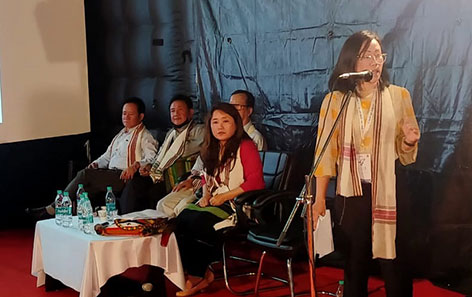ITANAGAR, 12 Apr: The Northeast Literary Festival, organised by the department of IPR (DIPR) in collaboration with the Arunachal Pradesh Literary Society (APLS), concluded here on Tuesday.
Speaking during the poetry recitation session – the last event of the two-day festival – the IPR minister’s adviser Laisam Simai exhorted one and all present to “keep alive their writing spirit and carry on their talents for prosperity.”
Expressing gratitude to the DIPR and the APLS for working towards promoting literature in the state through organising such literary festivals, “thereby providing a platform to the upcoming writers and poets to express themselves and improve their skills,” he expressed hope that such programmes would get better and witness more participation in the days to come.
Simai commended the untiring efforts being made by the literary pioneers of the state, Sahitya Akademi awardee YD Thongchi and Padmashri awardee Mamang Dai, for the growth of literature in the state.
He also recited three of his poems, ‘My Adorable Darling’, ‘Shadow’, and ‘Best Time’, written 15 years ago, to a thunderous applause.
Later, while summing up the poetry recitation session as moderator, Dai said that “writers fulfil social needs through their writings,” and called upon the young budding writers and poets to “stay connected with their quest for writing,” adding that “writing defines one’s identity.”
In his closing remarks, APLS president YD Thongchi thanked the state government for encouraging such literary activities. He informed that “this year the event focused more on local writers and poets for promoting local indigenous literatures.”
Thongchi said that the literary festivals organised earlier were well appreciated outside the state, and expressed hope that “Arunachal literature would grow tremendously, leaving behind other tribal literatures of the Northeast.”
Commending the young talents, Thongchi advocated writing poems in one’s own local dialect, “as emphasised by the Sahitya Akademi to promote indigenous dialects in Adivasi sammelans organised from time to time.
“This would save the local dialects from extinction, besides contributing towards the society,” he added.
Day two of the festival featured brainstorming sessions, including presentation of papers and discussions on the socio-cultural aspects of the state.
During the session moderated by RGU Assistant Professor Lisa Lomdak, retired family welfare director Dr Hage Tabyo spoke about his book Patang, “written on economic aspects of the Apatani society, their way of cultivation, etc.”
IPR Deputy Director Gijum Tali urged the younger generation to “nurture the relationship, bonding and the hardship that life and nature offer,” while Gazetteers Director Hage Pilya read out a chapter on Itanagar from his book Ranth Pike, which elaborates various aspects of the capital city. RGU research scholar Yater Nyokir in her presentation spoke on “the socio-cultural ethos of the tribal society through fictional writings.”
The short story reading session with Deomali-based WRGC Assistant Professor and moderator Chatung Lowang saw story presentations by Ajanta, Jahnvni Gogoi, Karlina Riba, Jon Pebi Tato, Morjum Loyi, and Dr Jamuna Bini, while the poetry recitation session with Mamang Dai as moderator saw the participation of several poets. They included Gangkhu Sumnyan, Likha Caral, Tolum Chumchum, Alenso Chai, Kolpi Dai, Rebom Belo, Mikri Riba, Biki Yader, Millo Ankha, Anguna Moyong, Lardik Kare, Shilpi, Rasmi Kulsi, and Ajay Kr Kulsi (who came here to participate from Kanpur, UP).
The two-day event ended with a special screening of the movie In the Land of Poison Woman, based on a novel written by Thongchi. (DIPR)



